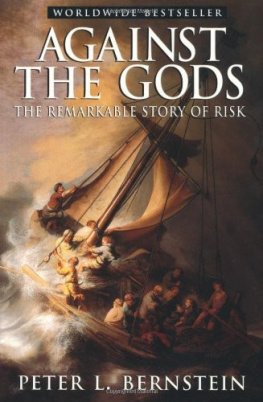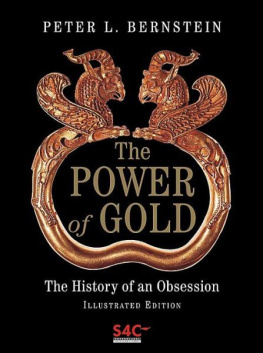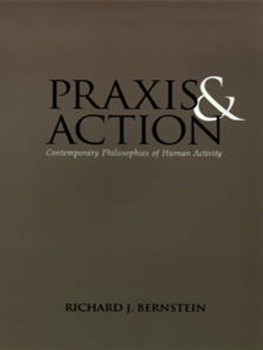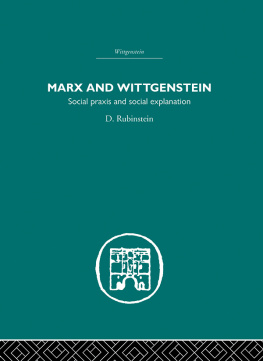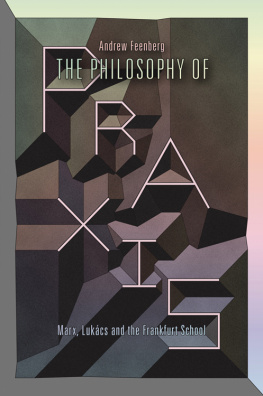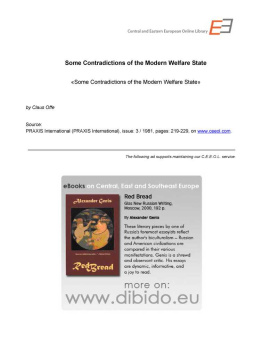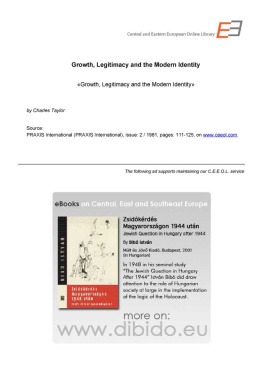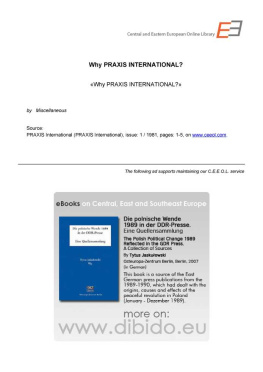Bernstein - Beyond objectivism and relativism: science, hermeneutics, and praxis
Here you can read online Bernstein - Beyond objectivism and relativism: science, hermeneutics, and praxis full text of the book (entire story) in english for free. Download pdf and epub, get meaning, cover and reviews about this ebook. City: Philadelphia, year: 1983, publisher: University of Pennsylvania Press, genre: Religion. Description of the work, (preface) as well as reviews are available. Best literature library LitArk.com created for fans of good reading and offers a wide selection of genres:
Romance novel
Science fiction
Adventure
Detective
Science
History
Home and family
Prose
Art
Politics
Computer
Non-fiction
Religion
Business
Children
Humor
Choose a favorite category and find really read worthwhile books. Enjoy immersion in the world of imagination, feel the emotions of the characters or learn something new for yourself, make an fascinating discovery.

Beyond objectivism and relativism: science, hermeneutics, and praxis: summary, description and annotation
We offer to read an annotation, description, summary or preface (depends on what the author of the book "Beyond objectivism and relativism: science, hermeneutics, and praxis" wrote himself). If you haven't found the necessary information about the book — write in the comments, we will try to find it.
Beyond objectivism and relativism: science, hermeneutics, and praxis — read online for free the complete book (whole text) full work
Below is the text of the book, divided by pages. System saving the place of the last page read, allows you to conveniently read the book "Beyond objectivism and relativism: science, hermeneutics, and praxis" online for free, without having to search again every time where you left off. Put a bookmark, and you can go to the page where you finished reading at any time.
Font size:
Interval:
Bookmark:
BEYOND OBJECTIVISM AND RELATIVISM
OBJECTIVISM
AND
RELATIVISM:
SCIENCE,
HERMENEUTICS,
AND PRAXIS
RICHARD J. BERNSTEIN

Copyright 1983 by the University of Pennsylvania Press
All rights reserved
Printed in the United States of America on acid-free paper
10 9 8
Published by
University of Pennsylvania Press
Philadelphia, Pennsylvania 19104-4011
Library of Congress Cataloging-in-Publication Data
Bernstein, Richard J.
Beyond objectivism and relativism : science, hermeneutics, and praxis.
Bibliography: p.
Includes index.
1. Hermeneutics. 2. SciencePhilosophy. 3. Objectivity. 4. Relativity. 5. Practice (Philosophy)
I. Title
BD241.B415 1983 121.68 83-12439
ISBN 0-8122-1165-0 (pbk. : alk.paper)
TO FOUR FRIENDS
Hannah Arendt
Hans-Georg Gadamer
Jrgen Habermas
Richard Rorty

Aristotle, Nicomachean Ethics
Writing, for me, has always been an adventure of discovery. This book itself is a stage in a personal and intellectual odysseyone which has opened new horizons of questioning. In Praxis and Action (1971), where I explored the meaning and centrality of the concepts of praxis and action in Marxism, Existentialism, Pragmatism, and Analytic Philosophy, I wrote in the introduction:
At first, it was the common negative stance of contemporary philosophers that most forcefully struck me. Most contemporary philosophers have been in revolt against the Cartesian framework. Descartes is frequently called the father of modern philosophy. If we are to judge by philosophy during the past hundred years, this title can best be understood in a Freudian sense. It is a common characteristic of many contemporary philosophers that they have sought to overthrow and dethrone the father.
When writing Praxis and Action, I was aware that there is significant common ground in the diverse attacks on the Cartesian foundations of modern philosophy, the spectator theory of knowledge, and in the new emphasis on the centrality of human agency and activity, but I did not at the time realize how much convergence and substantive agreement was to be discovered in the proposed alternatives to the Cartesian legacy. It was easier to isolate a common enemy than to discern a shared objective.
Only when I was in the final stages of completing The Restructuring of Social and Political Theory did I fully and dramatically realize that the themes I had been pursuing in both of these books, as well as in my earlier studies of the pragmatic thinkers, were gravitating toward the complex network of problems concerning the character, dimensions, and texture of human rationality and irrationality. All the pathways of my thinking kept drawing me ineluctably to the question of rationality. I felt the need and urgency to work through the rationality debates that were becoming so central in a great diversity of cultural contexts, to sort out what were the underlying issues, to see how they might be related to each other, and to confront the specter of relativism that always seemed to be hovering in the background of these discussions.
As I began to work through these tangled debates in the philosophy of the natural and social sciences, in the confrontation between hermeneutics and critical theory, and in contemporary reflections on practical rationality, political judgment, and praxis, I kept having an uncanny sense of dj vu. Let me illustrate what I mean with reference to three very different and apparently unrelated texts: Paul Feyerabends Against Method; Hans-Georg Gadamers Truth and Method; and Sheldon Wolins essay Political Theory as a Vocation. Whether we focus on the disciplinary matrices that characterize their investigations, their intellectual temperaments and styles, the traditions that inform their writings, or the specific issues they address, ones initial impression is that of radical differences. Feyerabend sharply criticizes prevailing orthodoxies in the philosophy of the natural sciences and attacks what he takes to be the myth of a determinate scientific method with fixed rational criteria. Gadamer focuses on the happening of understanding, especially as it pertains to tradition and the interpretation of works of art, literary texts, and history. Wolins theme is the critique of contemporary political science and a defense of the vocation of the political theorist. But when one compares these three works, despite the manifest and real differences, fundamental latent similarities leap to the foreground. All three develop radical critiques of the intellectually imperialistic claims made in the name of Method. Feyerabend seeks to expose and ridicule the belief that there is a determinate scientific method that guides the way in which science and living scientists really work. He is critical of the deification of science in contemporary life. Gadamer, who barely discusses natural science, argues that the modern obsession with Method has distorted and concealed the ontological character of understanding. Wolin explicitly attacks the vita methodi (which he contrasts with the bios theoretikos) and argues that it has deformed our understanding of politics and political judgment. As they probe the various aspects of the tyranny of Method, it becomes increasingly clear that they are raising profoundly critical questions about the categories, distinctions, and biases that have shaped our culture and our everyday lives since the seventeenth century. Each, in his own way, seeks to come to grips with what he takes to be the fundamental intellectual crisis of our time. But the similarities revealed in these diverse texts go further than a common attack on the very idea of Method. Each of them opens the way to a more historically situated, nonalgorithmic, flexible understanding of human rationality, one which highlights the tacit dimension of human judgment and imagination and is sensitive to the unsuspected contingencies and genuine novelties encountered in particular situations. Their technical analyses are also animated by a practical-moral concern with the threats to, and the prospects for, human judgment and imagination. There are even similarities and shared resonances in their positive characterizations of human judgment, which emphasize its practical character. Indeed, in unsuspected ways, the juxtaposition of these three texts helps to illuminate the strengths and weaknesses of what each of these thinkers is struggling to articulate. The similarities and family resemblances that I was discovering had application to a much wider range of thinkers and texts. As I worked back and forth among the different rationality debates, I kept noticing how similar issues were being raised, similar concerns were motivating these discussions, and how, despite diverse vocabularies, similar theses were being advanced and defended. My original hunches, conjectures, and hypotheses needed more careful explication, probing, and testing. At the time it was not entirely clear whether the interrelationships that I was discovering were only superficial and suggestive or whether they were a genuine indication of a more substantive convergence.
In the spring of 1976, I was invited to the University of Notre Dame to give a series of lectures in the Perspectives in Philosophy program. In this program a visiting philosopher is invited to share his or her work in progress. Prior to the visit, faculty and students read the philosophers work. In addition to giving public lectures, meetings are arranged for informal discussion. Notre Dames philosophy department is a congenial, lively, and critical community. The invitation to Notre Dame was an ideal opportunity to begin to expose and test ideas that were still in a formative stage. The experience at Notre Dame was exhilarating and soberingexhilarating because I encountered wide sympathy for the project I was undertaking, sobering because I was made painfully aware of how much needed to be done to clarify and support what I was trying to say and to show.
Next pageFont size:
Interval:
Bookmark:
Similar books «Beyond objectivism and relativism: science, hermeneutics, and praxis»
Look at similar books to Beyond objectivism and relativism: science, hermeneutics, and praxis. We have selected literature similar in name and meaning in the hope of providing readers with more options to find new, interesting, not yet read works.
Discussion, reviews of the book Beyond objectivism and relativism: science, hermeneutics, and praxis and just readers' own opinions. Leave your comments, write what you think about the work, its meaning or the main characters. Specify what exactly you liked and what you didn't like, and why you think so.

